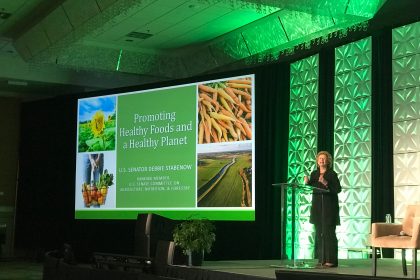
The voices of organic and natural advocates are critical to public policy, and change in the food system starts with farmers, food producers and even parents feeding their family in a healthy, sustainable way.
“Your voices matter more than ever. You are the reason we’ve seen so many changes in our food system over the past 85 years,” said Sen. Debbie Stabenow (D-Michigan), keynote speaker at Natural Products Expo West in Anaheim, Calif. Stabenow is the Ranking Member of the U.S. Senate Committee on Agriculture, Nutrition and Forestry and the co-author of the 2018 Farm Bill. “We’ve made progress, but there’s a lot more to do. That’s where all of you come in. “
Legislation is catching up with consumer desire. For the first time in U.S. history, organic food is permanently protected and protected under the current farm bill. The farm bill is the government’s primary food and agriculture policy tool, and it’s renewed every five years.
Organic food is a movement that’s been rising for decades, Stabenow said. Though it may feel like the organic industry just took off, Stabenow said “It’s moving more quickly now because of the incredible demand from the public. … Organics is the fastest growing part of our farm economy, so we made it a priority in the farm bill.”
“Now more than ever before people are paying attention to what they eat. They want to know where their food comes from and how it’s grown. … People are also becoming more interested in the hands that plant the seed, the soil in which they grow and the impact on our family’s health.”
The farm bill is the best example of how food policy has changed. The first farm bill was established in 1933, during the Great Depression. A national organics program wasn’t put in the bill until the 1990s.
The organic industry has grown from $3.6 billion in 1997 to over $50 billion today.
Stabenow is proud of the policies added to the 2018 Farm Bill, passed in a difficult political climate. Republicans control all parts of the federal government. And President Donald Trump has pushed for such tight regulations on the organics program that he’s been accused of “waging war” on the organics industry. But bipartisan support helped pass what Stabenow called “the most progressive farm bill yet.”
The major bill highlight for the organic industry was the establishment of permanent, mandatory funding for organics. Stabenow compared it to organics previously sitting at the “kid’s table” with temporary funding for organics that was depleted and reevaluated every five years.
“I’m proud to say we’re now at the adult’s table,” Stabenow said. “What does that mean? It means organic research and provisions will live on past the current farm bill. It means farmers markets and food hubs and community food provisions will continue to grow the local food movement.”
With organics finally protected, Stabenow said, it’s time to look at new ideas. What can propel the next farm bill with healthy and sustainable policies?
“As creators, as innovators as advocates you really are the engine driving our country to a more sustainable future, and I can’t think of anything more important than being able to do that,” she said.
